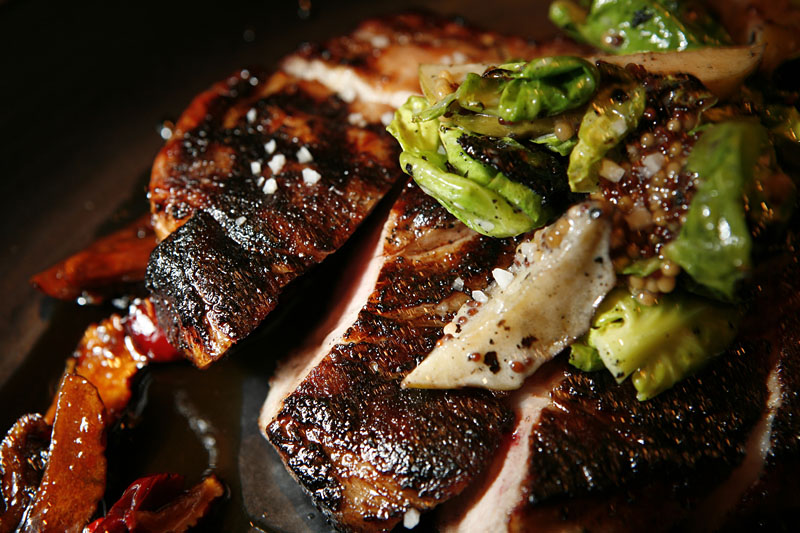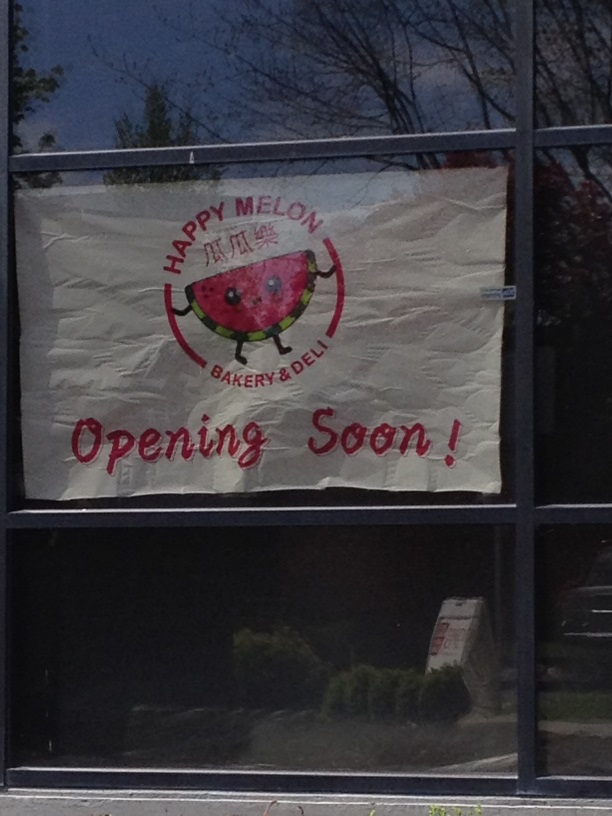Appropriately enough for a restaurant named after a physics principle governing how work gets done, Joule doesn’t tarry. Even on very busy nights, the reborn restaurant’s open kitchen performs at rattling speed, a pace which grows increasingly welcome as diners take their measure of the meat-driven menu. With the quality of the Korean-inspired food teeter-tottering from remarkable to regrettable—sometimes over the span of a single meal—the waits for summoned dishes become exercises in cautionary dread instead of eager anticipation. About that pork chop which the server touted as so extraordinary: Could it possibly be as tender and juicy as promised? Or, in the manner of the two most popular steak dishes, would it be undone by a meek sauce and overcooking so severe that the business of cutting and chewing might eventually trump attempts at conversation?Such worries are wasted on the pork chop, its soft, Mary Kay–pink slices edged by the sooty char that’s the souvenir of time well spent on a grill. The excellent chop’s served with a dollop of sticky-sweet date molasses, but diners who dote on the meat’s comely salt crust will gravitate toward the Germanic slaw—a warren of wrinkly greens, apples, and mustard seeds—which completes the plate. Still, skepticism is understandable in the face of Joule’s frustrating knack for goofing up dishes which boast dreamy descriptions.When chef/owners Rachel Yang and Seif Chirchi last fall relocated their 5-year-old restaurant from Wallingford, they took advantage of the transition to recalibrate Joule’s menu in the casual, compact mode that’s helped make the married couple’s second restaurant, Revel, a citywide favorite. Inspired by Revel’s summertime whole-animal feasts, they thrust red meat into the foreground, fashioning Joule as a Korean steakhouse of sorts. But here the meeting of fermented flavors and beef doesn’t result in the banchan and tabletop grills which rule the Korean barbecue scene. Instead, Joule features four shareable 8-ounce steaks and four black ceramic bowlfuls of vegetables which faintly recall the French fries and creamed spinach served at American steak palaces. Guests might complement their short rib or top sirloin with split stalks of Chinese broccoli cloaked with a slightly greasy walnut pesto, or what the menu tantalizingly calls “blackened white mushroom, bitter green.” Unfortunately, the mushrooms are blackened in much the way your house has been blackened when the insurance adjuster comes calling.It’s possible to string together a highly acceptable—perhaps even great—meal at Joule on the right night. Yet deviating from the correct ordering course is a near-guarantee of disappointment, and not just for diners who were infatuated with the restaurant’s first incarnation. I ate at the original Joule only once, so I don’t have a good point of comparison for the current one. But I count myself among Revel’s many fans, which probably elevated my expectations for Joule. It took three bum visits before I was willing to concede the restaurant wasn’t meeting them.A few of the problems afflicting Joule—such as strips of bacon served stiff and cold from the refrigerator with only an underlying pool of chili oil, jalapeno slices, and diced green onions to distinguish the appetizer from a desperate after-school snack—are positively unique to the restaurant. But what’s interesting about many of its overarching flaws is how clearly they summarize contemporary Seattle dining. Even in its failings, Joule is frightfully up-to-date.The menu—which uses the word “pickled” five times, “smoked” twice, and “wild” once—isn’t the only mark of modernity at Joule, which shares the trendy Graham Baba–designed Fremont Collective with The Whale Wins. Loosely divided into a bar and dining room with butcher-block tables pressed too close together, Joule is wall-papered with a vintage floral pattern centered around elongated diamond rings arranged as an atomic symbol. The paper’s aquamarine hue is repeated in a neon-lit Korean jewelry-store sign which hangs over the busy bar.Joule is always noisy, which adds to diners’ certainty that they’ll have a grand time. I listened in as eaters at two different tables, neither of whom had previously patronized the new Joule, confidently raved to their guests about the wonderfulness in store. Since the room’s decibel level doesn’t preclude eavesdropping, I wouldn’t classify it as too loud, but I’d also expect servers to take note of the surrounding buzz when speaking. Perhaps the server on my first visit had a bad case of bronchitis, but he never apologized for whispering, even when my guests and I showily leaned forward with hands cupped around our ears.Service on subsequent visits was similarly detached, although usually technically right. The quiet server didn’t squawk when one of my guests asked him to replace a too-sweet cocktail. To that end, the cocktails I sampled were badly imbalanced, but the phenomenally good roasted-corn tea—a carryover from the first Joule—begs for a bourbon splash. And while there are no low-end bargains on the wine list, Yang and Chirchi deserve credit for the all–Pacific Northwest lineup.The kitchen sometimes also seems divested of the customer experience, sending out dishes apparently assembled without any regard to presentation. That’s another common local foible, but it’s still disheartening to encounter a soupy mass of limp rice noodles nearly obscured by broccoli rabe leaves and sprigs of cilantro, or scattershot saucing on a salty short rib. A sloppy shrimp cocktail whacked with ginger beer was compromised by unevenly peeled, undeveined shrimp.But if I’m tough on Joule, it’s because the restaurant has the history, talent, vision, and community support needed to achieve culinary pre-eminence. Although the majority of Joule’s dishes are notably short on elegance and zip, there are flickers of hope beyond the pork chop. The burger, served on a buoyant kaiser roll smeared with horseradish, is admirably beefy. When the rice cakes are correctly crisped, it’s hard to resist their subtly spicy chorizo sauce. The stuffed white kimchi, a kind of Asian en croute preparation with cabbage inside and out, is terrific. And the risotto— closer in consistency to congee—is an unheralded gem: Threaded with seaweed and topped with rings of pickled leeks, it’s sharp with Puget Sound flavors. All five dishes belong on your to-order list. At least for now, just don’t stray too far from it. hraskin@seattleweekly.com PRICE GUIDE Shrimp cocktail $9 Stuffed kimchi $6 Creamed Swiss chard $9 Roasted potato $9 Short rib $18 Coulotte $18 Burger $16Pork chop $17
Appropriately enough for a restaurant named after a physics principle governing how








